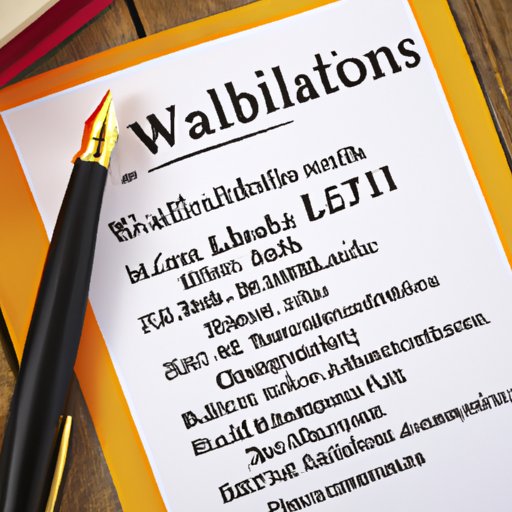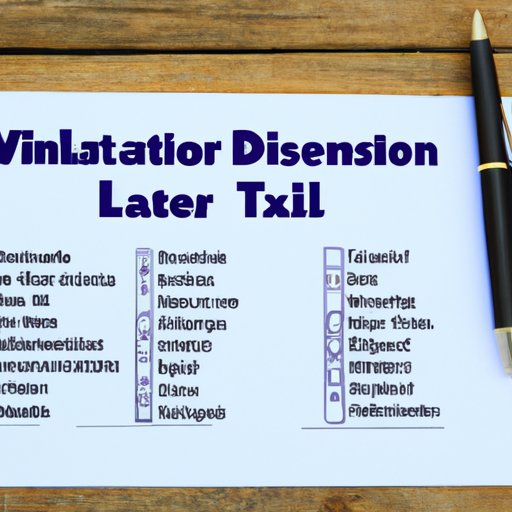Introduction
When someone dies without a valid will, they are said to have died “intestate”. The state then has the right to distribute their assets according to the laws of intestacy. However, if the deceased left behind a valid will, it becomes the responsibility of the appointed executor to ensure that the wishes of the deceased are carried out. Being an executor of a will can be a difficult and time-consuming task, but it is important to understand the role and responsibilities before assuming the position.

Overview of the Role and Responsibilities of an Executor of a Will
The executor of a will is responsible for handling the deceased’s estate, which includes collecting any assets, paying off any debts, and distributing the remaining funds to the beneficiaries. The executor must also file all necessary paperwork with the court, such as the death certificate and the will itself. In some cases, the executor may also need to apply for probate from the court, which is a legal process that allows the executor to access the assets in the estate.
The executor has certain duties to the estate, including ensuring that all assets are collected and protected, that creditors are paid, and that any taxes due to the government are paid. They must also keep detailed records of all transactions related to the estate and provide reports to the court if required. The executor is also responsible for making sure the estate is distributed according to the provisions of the will.
The executor also has certain duties to the beneficiaries, including providing them with accurate information about the estate and keeping them informed of any changes in the status of the estate. The executor must also respond to any inquiries or complaints made by the beneficiaries. Finally, the executor is responsible for ensuring that all beneficiaries receive their rightful share of the estate.
Benefits and Challenges of Serving as an Executor of a Will
Serving as an executor of a will can be a rewarding experience, as it gives you the opportunity to carry out the wishes of the deceased. It can also be a way to honor the memory of a loved one. Additionally, serving as an executor can give you valuable experience in managing finances and dealing with legal matters.
However, there can be challenges associated with being an executor of a will. For example, it can be a long and complicated process, requiring a lot of time and energy. There is also a financial burden associated with being an executor, as you may be personally liable for any mistakes you make. Additionally, there may be disagreements between beneficiaries, which can create tension and confusion.
Steps Necessary to Become an Executor of a Will
If you are considering becoming an executor of a will, there are several steps you should take. Here we outline the three most important steps:
Choosing an Executor
The first step is to choose an executor. This is typically done when the will is drafted, although it can also be done at any time afterward. When choosing an executor, it is important to consider the person’s age, health, and financial situation. You should also consider whether the person is willing and able to handle the responsibilities of being an executor.
Drafting or Updating the Will
Once an executor has been chosen, the next step is to draft or update the will. This document should include specific instructions regarding the distribution of assets, as well as any other wishes of the deceased. The will should be signed and notarized in order to be legally binding.
Signing and Notarizing the Will
The final step is to sign and notarize the will. This ensures that the will is legally valid and can be enforced. The notary public must witness the signing of the will and certify that the document was signed by the testator (the person who made the will) and two witnesses. It is important to note that the witnesses cannot be beneficiaries of the will.

Legal Requirements and Obligations of an Executor of a Will
Once you become an executor of a will, there are certain legal requirements and obligations that you must fulfill. Here is a brief overview of the most important ones:
Duties to the Estate
As the executor of a will, you have certain duties to the estate. These include collecting any assets, paying off any debts, filing paperwork with the court, and applying for probate. You must also keep detailed records of all transactions related to the estate and provide reports to the court if required.
Duties to Beneficiaries
As the executor of a will, you also have certain duties to the beneficiaries. These include providing them with accurate information about the estate and keeping them informed of any changes in the status of the estate. You must also respond to any inquiries or complaints made by the beneficiaries. Finally, you must ensure that all beneficiaries receive their rightful share of the estate.
Liability for Errors
It is important to remember that you may be held personally liable for any mistakes you make while serving as an executor of a will. Therefore, it is important to understand the role and responsibilities thoroughly and to seek professional advice if necessary.

Advice on How to Manage the Duties of an Executor of a Will
Managing the duties of an executor of a will can be a daunting task. To make the process easier, here are some tips:
Seek Professional Advice
It is important to seek professional advice if you are unsure about any aspect of the role and responsibilities of an executor. An experienced attorney or financial planner can help you understand your legal obligations and provide guidance on how to best manage the estate.
Maintain Open Communication with Beneficiaries
It is important to maintain open communication with the beneficiaries throughout the process. This will help to ensure that everyone is kept up to date with the progress of the estate and any changes that may occur. Additionally, it will help to avoid any misunderstandings or disagreements between the beneficiaries.
Keep Detailed Records
It is essential to keep detailed records of all transactions related to the estate. This includes all bank statements, invoices, receipts, and documents related to the sale or transfer of assets. Keeping detailed records will help you to stay organized and ensure that all transactions are accounted for.
Conclusion
Being an executor of a will is a serious responsibility and can be a challenging task. It is important to understand the role and responsibilities and to take the necessary steps to ensure that the will is properly managed. By seeking professional advice, maintaining open communication with beneficiaries, and keeping detailed records, you can successfully manage the duties of an executor of a will.
(Note: Is this article not meeting your expectations? Do you have knowledge or insights to share? Unlock new opportunities and expand your reach by joining our authors team. Click Registration to join us and share your expertise with our readers.)
